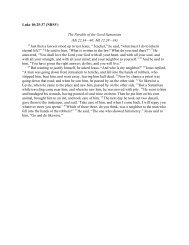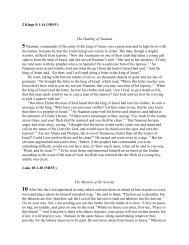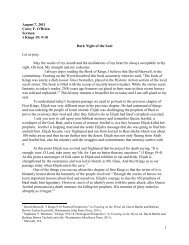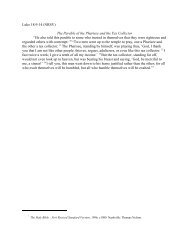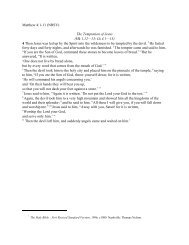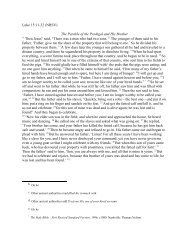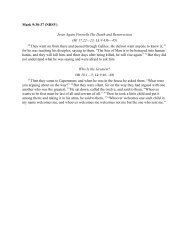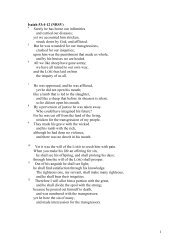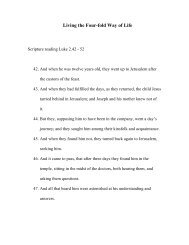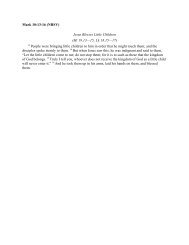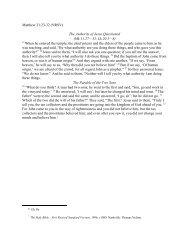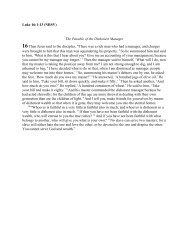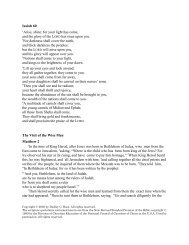Deuteronomy 8:7-18 7 For the Lord your God is bringing you into a ...
Deuteronomy 8:7-18 7 For the Lord your God is bringing you into a ...
Deuteronomy 8:7-18 7 For the Lord your God is bringing you into a ...
- No tags were found...
Create successful ePaper yourself
Turn your PDF publications into a flip-book with our unique Google optimized e-Paper software.
<strong>Deuteronomy</strong> 8:7-<strong>18</strong><br />
7<br />
<strong>For</strong> <strong>the</strong> <strong>Lord</strong> <strong><strong>you</strong>r</strong> <strong>God</strong> <strong>is</strong> <strong>bringing</strong> <strong>you</strong> <strong>into</strong> a good land, a land with flowing streams,<br />
with springs and underground waters welling up in valleys and hills, 8 a land of wheat and barley,<br />
of vines and fig trees and pomegranates, a land of olive trees and honey, 9 a land where <strong>you</strong> may<br />
eat bread without scarcity, where <strong>you</strong> will lack nothing, a land whose stones are iron and from<br />
whose hills <strong>you</strong> may mine copper. 10 You shall eat <strong><strong>you</strong>r</strong> fill and bless <strong>the</strong> <strong>Lord</strong> <strong><strong>you</strong>r</strong> <strong>God</strong> for <strong>the</strong><br />
good land that has been given <strong>you</strong>.<br />
11<br />
Take care that <strong>you</strong> do not forget <strong>the</strong> <strong>Lord</strong> <strong><strong>you</strong>r</strong> <strong>God</strong>, by failing to keep <strong>the</strong><br />
commandments, <strong>the</strong> ordinances, and <strong>the</strong> statutes, which I am commanding <strong>you</strong> today. 12 When<br />
<strong>you</strong> have eaten <strong><strong>you</strong>r</strong> fill and have built fine houses and live in <strong>the</strong>m, 13 and when <strong><strong>you</strong>r</strong> herds and<br />
flocks have multiplied, and <strong><strong>you</strong>r</strong> silver and gold <strong>is</strong> multiplied, and all that <strong>you</strong> have <strong>is</strong> multiplied,<br />
14<br />
<strong>the</strong>n do not exalt <strong><strong>you</strong>r</strong>self, forgetting <strong>the</strong> <strong>Lord</strong> <strong><strong>you</strong>r</strong> <strong>God</strong>, who brought <strong>you</strong> out of <strong>the</strong> land of<br />
Egypt, out of <strong>the</strong> house of slavery, 15 who led <strong>you</strong> through <strong>the</strong> great and terrible wilderness, an<br />
arid wasteland with po<strong>is</strong>onous snakes and scorpions. The <strong>Lord</strong> <strong><strong>you</strong>r</strong> <strong>God</strong> made water flow for<br />
<strong>you</strong> from flint rock, 16 and fed <strong>you</strong> in <strong>the</strong> wilderness with manna that <strong><strong>you</strong>r</strong> ancestors did not<br />
know, to humble <strong>you</strong> and to test <strong>you</strong>, and in <strong>the</strong> end to do <strong>you</strong> good. 17 Do not say to <strong><strong>you</strong>r</strong>self,<br />
"My power and <strong>the</strong> might of my own hand have gotten me th<strong>is</strong> wealth." <strong>18</strong> But remember <strong>the</strong> <strong>Lord</strong><br />
<strong><strong>you</strong>r</strong> <strong>God</strong>, who gives <strong>you</strong> power to get wealth, in order that <strong>the</strong> covenant sworn to <strong><strong>you</strong>r</strong> ancestors<br />
may be confirmed, as, in fact, <strong>the</strong> <strong>Lord</strong> <strong><strong>you</strong>r</strong> <strong>God</strong> <strong>is</strong> doing today.<br />
Copyright © 2002 by Dudley C. Rose. All rights reserved.<br />
The scripture quotations contained herein are from <strong>the</strong> New Rev<strong>is</strong>ed Standard Version of <strong>the</strong> Bible, copyright ©<br />
1989 by <strong>the</strong> Div<strong>is</strong>ion of Chr<strong>is</strong>tian Education of <strong>the</strong> National Council of Churches of Chr<strong>is</strong>t in <strong>the</strong> U.S.A. Used by<br />
perm<strong>is</strong>sion. All rights reserved.
Remember <strong>the</strong> <strong>Lord</strong> Your <strong>God</strong><br />
A sermon preached at North-Prospect United Church of Chr<strong>is</strong>t, Cambridge, Massachusetts<br />
Date: November 24, 2002<br />
Rev. Dudley C. Rose<br />
Text: <strong>Deuteronomy</strong> 8:7-<strong>18</strong>.<br />
There <strong>is</strong> a tension in our beliefs, or at least <strong>the</strong>re <strong>is</strong> in mine. There used to be a poster in<br />
<strong>the</strong> parlor. It said, “I used to think somebody ought to do something. Then I realized I am<br />
somebody.” It meant that each of us can make a difference, if we make <strong>the</strong> effort.<br />
Pulling at <strong>the</strong> o<strong>the</strong>r end of <strong>the</strong> rope, though, <strong>is</strong> <strong>the</strong> idea that <strong>the</strong> bounty comes from <strong>God</strong>.<br />
In <strong>the</strong> passage we heard th<strong>is</strong> morning from <strong>Deuteronomy</strong>, <strong>God</strong> says, “ 17 Do not say to <strong><strong>you</strong>r</strong>self,<br />
"My power and <strong>the</strong> might of my own hand have gotten me th<strong>is</strong> wealth." <strong>18</strong> But remember <strong>the</strong> <strong>Lord</strong><br />
<strong><strong>you</strong>r</strong> <strong>God</strong>, who gives <strong>you</strong> power to get wealth.”<br />
So, <strong>is</strong> it we, or do things come from <strong>God</strong>”<br />
There <strong>is</strong> <strong>the</strong> story of a <strong>you</strong>ng man who bought a farm. He and h<strong>is</strong> wife were from a long<br />
way away, and when <strong>the</strong>y bought <strong>the</strong> farm, a lot of people laughed. The old Fairchild farm had<br />
lain fallow for many years. Brush and tangles had grown up in <strong>the</strong> fields. The barns were falling<br />
down. The roofs leaked and pieces of <strong>the</strong> siding had fallen completely off. No one in <strong>the</strong>ir right<br />
mind would buy <strong>the</strong> Fairchild farm.<br />
But <strong>the</strong> <strong>you</strong>ng man and h<strong>is</strong> wife did. And <strong>the</strong>y worked day and night to make <strong>the</strong> place<br />
<strong>into</strong> a producing farm. By <strong>the</strong> second year <strong>the</strong>y had transformed <strong>the</strong> place. The fields had been<br />
tilled free of undergrowth. In <strong>the</strong>m straight <strong>the</strong> rows of <strong>the</strong> crops alternated in green bands with<br />
<strong>the</strong> rich brown bands of <strong>the</strong> earth. The new tin roofs shone brightly on <strong>the</strong> barns. New boards<br />
replaced <strong>the</strong> holes in <strong>the</strong> siding. People were amazed. The old Fairchild farm had been<br />
transformed <strong>into</strong> a farm anyone in <strong>the</strong> county would be proud of.<br />
One day <strong>the</strong> min<strong>is</strong>ter came by for a v<strong>is</strong>it. The min<strong>is</strong>ter noted that he hadn’t seen much of<br />
<strong>the</strong> <strong>you</strong>ng man and h<strong>is</strong> family in church. And <strong>the</strong> <strong>you</strong>ng man looked around at <strong>the</strong> farm and said,<br />
“Well, we’ve been pretty busy right here.” The min<strong>is</strong>ter looked around at <strong>the</strong> beautiful farm. He<br />
nodded in appreciation. “Farm sure does look good,” he said. “Yep, it sure <strong>is</strong> a wonderful job<br />
<strong>God</strong> has done with th<strong>is</strong> place.”<br />
The <strong>you</strong>ng man let <strong>the</strong> comment go. He offered <strong>the</strong> min<strong>is</strong>ter a drink of tea. In <strong>the</strong> house<br />
<strong>the</strong> minster looked around, again with appreciation, at <strong>the</strong> condition of <strong>the</strong> house. “Nice job <strong>God</strong><br />
did on <strong>the</strong> old house, that’s for sure.” The <strong>you</strong>ng man just said, “Yes, sir,” though he was biting<br />
h<strong>is</strong> lip a bit.<br />
After tea, <strong>the</strong>y walked through <strong>the</strong> newly repaired barns. And again <strong>the</strong> min<strong>is</strong>ter allowed<br />
that <strong>God</strong> had done wonderful job on <strong>the</strong> barns. By now <strong>the</strong> <strong>you</strong>ng man was glad <strong>the</strong> v<strong>is</strong>it was<br />
about over, and he escorted <strong>the</strong> min<strong>is</strong>ter to h<strong>is</strong> car.<br />
Copyright © 2002 by Dudley C. Rose. All rights reserved.<br />
The scripture quotations contained herein are from <strong>the</strong> New Rev<strong>is</strong>ed Standard Version of <strong>the</strong> Bible, copyright ©<br />
1989 by <strong>the</strong> Div<strong>is</strong>ion of Chr<strong>is</strong>tian Education of <strong>the</strong> National Council of Churches of Chr<strong>is</strong>t in <strong>the</strong> U.S.A. Used by<br />
perm<strong>is</strong>sion. All rights reserved.<br />
1
The min<strong>is</strong>ter took one more look around and said, “Yes sir, <strong>God</strong> sure has done a<br />
wonderful job with th<strong>is</strong> place.” Finally, <strong>the</strong> <strong>you</strong>ng man took <strong>the</strong> bait. As politely as he could,<br />
given that h<strong>is</strong> irritation was about to boil over, he said, “Reverend, <strong>you</strong> keep saying that <strong>God</strong> did<br />
all <strong>the</strong>se wonderful things around here. Just what do <strong>you</strong> mean by that”<br />
The min<strong>is</strong>ter answered, “Well <strong>you</strong>ng fella, <strong>God</strong> <strong>is</strong> <strong>the</strong> source of everything. Ah yes,<br />
<strong>you</strong>ng fella, we do very little. It’s all <strong>God</strong>.”<br />
The <strong>you</strong>ng man thought for a moment. Then he said, “Is that so Is that so Well,<br />
Reverend, <strong>you</strong> should have seen th<strong>is</strong> place when <strong>God</strong> was working on it alone.”<br />
Is it we Or do things come from <strong>God</strong><br />
*** We human beings are a funny lot. The people who have <strong>the</strong> most seem to be <strong>the</strong><br />
most certain that <strong>the</strong>y are solely responsible for what <strong>the</strong>y have. According to <strong>the</strong> wealthy, <strong>the</strong><br />
wealthy earn it. Th<strong>is</strong> fact has been an unending frustration for <strong>God</strong>. <strong>God</strong> has th<strong>is</strong> chosen people.<br />
<strong>God</strong> has th<strong>is</strong> chosen people Israel. Now, it didn’t go all that well with <strong>the</strong> people Israel in <strong>the</strong><br />
desert with Moses. They complained about <strong>the</strong> food and <strong>the</strong> water and <strong>the</strong> bad directions. They<br />
even built a golden calf, which really made <strong>God</strong> as mad as a hatter.<br />
But if truth be told, <strong>God</strong> was far more worried about when <strong>the</strong> people got to <strong>the</strong> prom<strong>is</strong>ed<br />
land than <strong>God</strong> was ever worried in <strong>the</strong> desert. In <strong>the</strong> desert <strong>the</strong> people were grumpy and stiffnecked<br />
a lot of <strong>the</strong> time, but <strong>the</strong>y knew who delivered <strong>the</strong>m when <strong>the</strong>ir backs were against <strong>the</strong><br />
sea. They knew who provided water when <strong>the</strong>y thought <strong>the</strong>y would die of thirst and manna when<br />
<strong>the</strong>y thought <strong>the</strong>y would faint from hunger. True, <strong>God</strong>’s people are always a handful, even at<br />
<strong>the</strong>ir best. Does that sound like any of <strong>God</strong>’s people <strong>you</strong> know<br />
But <strong>God</strong> was really worried, though, that when <strong>the</strong>y got to <strong>the</strong> prom<strong>is</strong>ed land, “a good<br />
land, a land with flowing streams, with springs and underground waters welling up in valleys and<br />
hills, 8 a land of wheat and barley, of vines and fig trees and pomegranates, a land of olive trees<br />
and honey, 9 a land where <strong>you</strong> may eat bread without scarcity, where <strong>you</strong> will lack nothing,” <strong>God</strong><br />
worried than when <strong>the</strong>y got <strong>the</strong>re <strong>the</strong>y would exalt <strong>the</strong>mselves and forget <strong>the</strong> <strong>Lord</strong> <strong>the</strong>ir <strong>God</strong>.<br />
Among some families <strong>the</strong>re <strong>is</strong> a Thanksgiving dinner custom. Set beside each plate are<br />
five kernels of dried corn. And around <strong>the</strong> Thanksgiving table each family member, one after<br />
ano<strong>the</strong>r, tells <strong>the</strong> rest five things <strong>the</strong>y have been thankful for <strong>the</strong> year.<br />
Do any of <strong>you</strong> know where <strong>the</strong> custom comes from [wait] Legend and maybe h<strong>is</strong>tory has<br />
it that when <strong>the</strong> Pilgrims came to Plymouth, blown far off course from <strong>the</strong>ir intended landing in<br />
Virginia, and with winter coming on, when <strong>the</strong> Pilgrims came to Plymouth, <strong>the</strong>y were hardly<br />
prepared. Indeed, <strong>the</strong> sea voyage itself in those days was harsh, perhaps even a reckless thing to<br />
do. The advert<strong>is</strong>ements of <strong>the</strong> time adv<strong>is</strong>ed that <strong>the</strong> first order of business before undertaking a<br />
transatlantic voyage was to write out <strong><strong>you</strong>r</strong> will. But even after safe arrival, <strong>the</strong> Pilgrims faced <strong>the</strong><br />
winter wholly unprepared. By spring over one half of <strong>the</strong> community had per<strong>is</strong>hed. During<br />
January and February it was not unusual to have two or three deaths a day among <strong>the</strong>ir small<br />
company. It <strong>is</strong> said that during <strong>the</strong> worst of it, each person had but five kernels of corn to eat<br />
each day.<br />
Copyright © 2002 by Dudley C. Rose. All rights reserved.<br />
The scripture quotations contained herein are from <strong>the</strong> New Rev<strong>is</strong>ed Standard Version of <strong>the</strong> Bible, copyright ©<br />
1989 by <strong>the</strong> Div<strong>is</strong>ion of Chr<strong>is</strong>tian Education of <strong>the</strong> National Council of Churches of Chr<strong>is</strong>t in <strong>the</strong> U.S.A. Used by<br />
perm<strong>is</strong>sion. All rights reserved.<br />
2
In April <strong>the</strong> Mayflower headed back to England, but <strong>the</strong> Pilgrims stayed in Plymouth,<br />
where by <strong>the</strong>n <strong>the</strong>y had befriended <strong>the</strong> Wampanoags. By fall <strong>the</strong>y held a feast of thanksgiving. It<br />
<strong>is</strong> easy to get caught in <strong>the</strong> romance of <strong>the</strong> Pilgrim story. But whatever one thinks of those<br />
beginnings and <strong>the</strong>ir aftermath, two things stick out to me. In April, which T.S. Eliot identified<br />
as <strong>the</strong> cruelest month, in <strong>the</strong> cruel month of April, barely after <strong>the</strong> break of winter, th<strong>is</strong> band of<br />
families let <strong>the</strong>ir ship sail home to <strong>the</strong> relative safety of England and remained in <strong>the</strong> new world<br />
to make a life. And in <strong>the</strong> fall, but eight months after a winter that had <strong>the</strong>m bury half <strong>the</strong>ir loved<br />
ones, <strong>the</strong>y held a feast in gratitude to <strong>God</strong> for <strong>the</strong> harvest and for <strong>the</strong>ir good fortune. I am<br />
impressed that in <strong>the</strong> face of such hardship and heartache <strong>the</strong>y decided to stay. I am perhaps even<br />
more impressed that by fall <strong>the</strong>y were celebrating <strong>the</strong>ir good fortune, when <strong>the</strong>ir fortune was<br />
mixed at best. And I am most impressed of all that after all <strong>the</strong> hard work on <strong>the</strong>ir parts to<br />
survive, <strong>the</strong>y gave thanks to <strong>God</strong>.<br />
I’m not certain why it <strong>is</strong> that after great loss, and survival still a question mark, <strong>the</strong><br />
Pilgrims were moved to gratitude, or why <strong>the</strong> ancient Israelites, or Americans, for that matter,<br />
when <strong>the</strong>y live in abundance, take most of <strong>the</strong> credit, with but a passing nod to <strong>God</strong>. I’m not sure<br />
why, but I do have a couple of guesses. First, many people I fear see <strong>God</strong> as a safety net. When<br />
<strong>the</strong>y think <strong>the</strong>y are doing fine on <strong>the</strong>ir own, <strong>God</strong> <strong>is</strong>n’t that relevant. It’s <strong>the</strong> flip side of <strong>the</strong> old<br />
saying that <strong>the</strong>re are no a<strong>the</strong><strong>is</strong>ts in fox holes.<br />
A less cynical, though related, reason has its origins in farming. Safiya Sofua says, “The<br />
words "harvest" and "thanksgiving" are linked toge<strong>the</strong>r in many cultures. Most who till <strong>the</strong> soil<br />
know that our feeble human efforts do not produce crops; crops require sun and rain and o<strong>the</strong>r<br />
variables that are beyond our control. The early settlers and <strong>the</strong> indigenous people <strong>the</strong>y found<br />
here also recognized <strong>the</strong> importance of <strong>God</strong>'s prov<strong>is</strong>ion for survival. Hundreds of years later, a<br />
commemorative meal serves as a reminder for us to thank <strong>God</strong> for those things necessary for our<br />
survival.”<br />
Farmers as much as any people know that things are out of <strong>the</strong>ir control. They work hard,<br />
to be sure, but rain at <strong>the</strong> right time or hail at <strong>the</strong> wrong time make <strong>the</strong> difference between a crop<br />
and a failed harvest. When one lives close to <strong>the</strong> true rhythms of ex<strong>is</strong>tence, it <strong>is</strong> much more<br />
difficult to fool oneself <strong>into</strong> believing that <strong>you</strong> control <strong><strong>you</strong>r</strong> world, and that <strong>you</strong> need be thankful<br />
only for <strong><strong>you</strong>r</strong> own good efforts, thank <strong>you</strong> very much.<br />
The tradition of <strong>the</strong> five kernels of corn and saying aloud five things for which <strong>you</strong> are<br />
thankful, <strong>the</strong>n, <strong>is</strong> a tradition which helps us remember how much of life <strong>is</strong> out of our control,<br />
help us remember how thankful a group in our h<strong>is</strong>tory was even after <strong>the</strong>y had lost so much and<br />
had so little, and helps us remember <strong>the</strong> <strong>Lord</strong> our <strong>God</strong>.<br />
I ra<strong>the</strong>r vividly recall sitting in <strong>the</strong> pew in church as a child and l<strong>is</strong>tening to sermons. I<br />
recall sermons that hit a perfect ending point, and <strong>the</strong>n went on for ano<strong>the</strong>r ten minutes, ten<br />
minutes which rarely improved <strong>the</strong> thing, and quite often made a quite good sermon a quite bad<br />
one. I am aware that we have arrived at a logical ending point. You have been reminded of how<br />
little <strong>you</strong> control and admon<strong>is</strong>hed, even in <strong><strong>you</strong>r</strong> abundance to remember and give thanks to <strong>God</strong>.<br />
I have d<strong>is</strong>charged my duty as a preacher in a true Calvin<strong>is</strong>t way. I have told <strong>you</strong> that nei<strong>the</strong>r <strong>you</strong><br />
Copyright © 2002 by Dudley C. Rose. All rights reserved.<br />
The scripture quotations contained herein are from <strong>the</strong> New Rev<strong>is</strong>ed Standard Version of <strong>the</strong> Bible, copyright ©<br />
1989 by <strong>the</strong> Div<strong>is</strong>ion of Chr<strong>is</strong>tian Education of <strong>the</strong> National Council of Churches of Chr<strong>is</strong>t in <strong>the</strong> U.S.A. Used by<br />
perm<strong>is</strong>sion. All rights reserved.<br />
3
nor things in general may be as good as <strong>the</strong>y seem, and give <strong>the</strong> thanks to <strong>God</strong>. Well, I may not<br />
have said exactly that, but to my own way of thinking, we need a little better inspiration than I<br />
have given yet for admon<strong>is</strong>hing <strong>you</strong> to gratitude, to thanksgiving. So, a few minutes more of<br />
<strong><strong>you</strong>r</strong> time, please.<br />
Denn<strong>is</strong> Prager has written a book called, “Happiness Is a Serious Problem.” “There <strong>is</strong> a<br />
`secret to happiness,” Prager writes, “and it <strong>is</strong> gratitude. All happy people are grateful, and<br />
ungrateful people cannot be happy. We tend to think that it <strong>is</strong> being unhappy that leads people to<br />
complain, but it <strong>is</strong> truer to say that it <strong>is</strong> complaining that leads to people becoming unhappy.<br />
Become grateful and <strong>you</strong> will become a much happier person.” 1<br />
Jeff Jacoby writes:<br />
If <strong>you</strong> never give a moment's thought to <strong>the</strong> fact that <strong><strong>you</strong>r</strong> health <strong>is</strong> good, that <strong><strong>you</strong>r</strong><br />
children are well-fed, that <strong><strong>you</strong>r</strong> home <strong>is</strong> comfortable, … if <strong>you</strong> assume that <strong>the</strong><br />
good things in <strong><strong>you</strong>r</strong> life are “normal” and to be expected, <strong>you</strong> dimin<strong>is</strong>h <strong>the</strong><br />
happiness <strong>the</strong>y can bring <strong>you</strong>. By contrast, if <strong>you</strong> train <strong><strong>you</strong>r</strong>self to reflect on how<br />
much worse off <strong>you</strong> could be, if <strong>you</strong> develop <strong>the</strong> custom of counting <strong><strong>you</strong>r</strong><br />
blessings and being grateful for <strong>the</strong>m, <strong>you</strong> will fill <strong><strong>you</strong>r</strong> life with cheer.<br />
It can be hard to do. Like most useful skills, it takes years of practice before it<br />
becomes second nature. Th<strong>is</strong> <strong>is</strong> one reason, Prager writes, that religion, sincerely<br />
practiced, leads to happiness - it ingrains <strong>the</strong> habits of thankfulness. People who<br />
thank <strong>God</strong> before each meal, for example, inculate gratitude in <strong>the</strong>mselves. In so<br />
doing, <strong>the</strong>y open <strong>the</strong> door to gladness.<br />
In a sense, gratitude <strong>is</strong> an expression of modesty. In Hebrew, <strong>the</strong> word for<br />
gratitude - hoda'ah - <strong>is</strong> <strong>the</strong> same as <strong>the</strong> word for confession. To offer thanks <strong>is</strong> to<br />
confess dependence, to acknowledge that o<strong>the</strong>rs have <strong>the</strong> power to benefit <strong>you</strong>, to<br />
admit that <strong><strong>you</strong>r</strong> life <strong>is</strong> better because of <strong>the</strong>ir efforts. 2<br />
When <strong>God</strong> looked at <strong>the</strong> people Israel, whom <strong>God</strong> loved and whom <strong>God</strong> had chosen, <strong>God</strong><br />
faced a very difficult dilemma. <strong>God</strong> wanted <strong>the</strong> people to know abundance, a land flowing with<br />
milk and honey, a good life. But <strong>God</strong> was afraid <strong>the</strong> people would not remember <strong>the</strong>ir <strong>God</strong>.<br />
Now, one way to understand <strong>God</strong>’s worry <strong>is</strong> to say that <strong>God</strong> <strong>is</strong> a jealous <strong>God</strong>, a <strong>God</strong> who does<br />
not like to be forgotten. Maybe. But my guess <strong>is</strong> that <strong>the</strong> real dilemma <strong>God</strong> faced was that <strong>God</strong><br />
wanted <strong>the</strong> people to have goodness, and to know joy, and that if <strong>the</strong>y lost <strong>the</strong>ir sense of<br />
gratitude, <strong>the</strong>y would, in fact, be m<strong>is</strong>erable. There are a hundred more sermons on th<strong>is</strong> point<br />
alone. There are a hundred sermons about how abundance without gratitude becomes<br />
1<br />
Quoted by Jeff Jacoby, “Boston Globe,” November 23, 2000<br />
2 Ibid<br />
Copyright © 2002 by Dudley C. Rose. All rights reserved.<br />
The scripture quotations contained herein are from <strong>the</strong> New Rev<strong>is</strong>ed Standard Version of <strong>the</strong> Bible, copyright ©<br />
1989 by <strong>the</strong> Div<strong>is</strong>ion of Chr<strong>is</strong>tian Education of <strong>the</strong> National Council of Churches of Chr<strong>is</strong>t in <strong>the</strong> U.S.A. Used by<br />
perm<strong>is</strong>sion. All rights reserved.<br />
4
consumer<strong>is</strong>m, becomes greed, becomes jealousy, becomes an unquenchable hunger, threatens<br />
even to take <strong>the</strong> planet down. But for today, suffice it say, abundance without gratitude <strong>is</strong> a<br />
bottomless well of unhappiness. And life, whe<strong>the</strong>r facing hardship or knowing <strong>the</strong> good times, a<br />
life lived in gratitude, <strong>the</strong> life remembering <strong>the</strong> <strong>Lord</strong> <strong><strong>you</strong>r</strong> <strong>God</strong>, <strong>is</strong> a life that <strong>God</strong> has desired for<br />
<strong>you</strong>. A life of blessings and joy. Remember, <strong>the</strong>n, <strong>the</strong> <strong>Lord</strong> <strong><strong>you</strong>r</strong> <strong>God</strong>. And be ye thankful<br />
always. Amen.<br />
Copyright © 2002 by Dudley C. Rose. All rights reserved.<br />
The scripture quotations contained herein are from <strong>the</strong> New Rev<strong>is</strong>ed Standard Version of <strong>the</strong> Bible, copyright ©<br />
1989 by <strong>the</strong> Div<strong>is</strong>ion of Chr<strong>is</strong>tian Education of <strong>the</strong> National Council of Churches of Chr<strong>is</strong>t in <strong>the</strong> U.S.A. Used by<br />
perm<strong>is</strong>sion. All rights reserved.<br />
5



